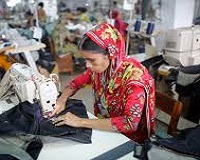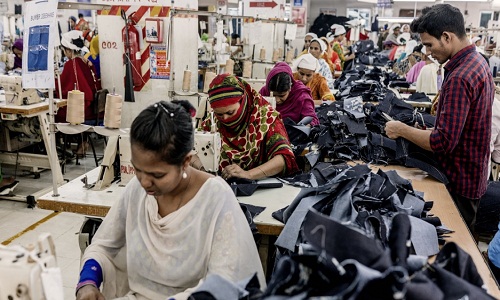"Migrant women workers have a tough time working in garment factories, reveals a recent ICN (The India Committee of the Netherlands) and Clean Clothes Campaign report, ‘Labour without liberty – female migrant workers in Bangalore’s garment industry’. It found five out of the 11, ILO indicators for forced labour exist in the Bengaluru garment industry: abuse of vulnerability, deception as a result of false promises (wages etc.), restriction of movement in the hostel, intimidation and threats, and abusive working and living conditions."

Migrant women workers have a tough time working in garment factories, reveals a recent ICN (The India Committee of the Netherlands) and Clean Clothes Campaign report, ‘Labour without liberty – female migrant workers in Bangalore’s garment industry’. It found five out of the 11, ILO indicators for forced labour exist in the Bengaluru garment industry: abuse of vulnerability, deception as a result of false promises (wages etc.), restriction of movement in the hostel, intimidation and threats, and abusive working and living conditions. Some of these aspects are also felt to a certain extent by the local workforce but are more strongly experienced by migrant workers. ICN is a Dutch human rights organisation dedicated to improving the lives of the marginalized in South Asia.

The three factories in the research belong to the largest garment manufacturing companies in Bengaluru. Together they employ more than 4,000 workers in various units in the country. According to export data, these are their buyers: Abercrombie & Fitch, Benetton, C&A, Calvin Klein and Tommy Hilfiger (both PVH), Columbia Sportswear, Decathlon, Gap, H&M, Levi Strauss, Marks & Spencer. Most of these brands have code of conducts that prohibit forced labour, child labour and other labour rights violations. Responding to an ICN report ‘Unfree and Unfair’ from January 2016 on the living and working conditions of migrants in Bengaluru, C&A, GAP, H&M and PVH had indicated some concrete commitments. Though there has been research by them affirming the findings of ‘Unfree and Unfair’ and a meeting with suppliers, after almost two years most of their commitments still have to be put in practice.
The real conditions on ground
While official statistics on migrants still do not exist, trade unions estimate that there are between 15,000 and 70,000 migrant women from northern states working in the Bengaluru garment industry. Before travelling to the factories, they are trained in skill development centres in Jharkhand or Odisha. These centres are often part of government sponsored schemes which fall under Skill India. Skill enhancement is one of the pillars of ‘Make in India’, Prime Minister Modi’s major initiative to create employment opportunities and stimulate economic growth.
Recruitment agents are known for not informing recruits about their legal entitlements. They promise salaries ranging from about €65 to €105 and other benefits like free accommodation and food. But the scene is completely difficult when they actually start working. They get paid less without having any additional help on stay and food. Owing to which, they live in hostels with cramped rooms and are not allowed to leave on weekday evenings. Only on Sundays, they are allowed two to three hours away from the hostel grounds. More alarming fact is that they claim to be eighteen, but in reality they are just 15 or 16 years old. Even beyond this, they are being abused in local language which they don’t understand and are being pushed to work faster. This plight takes a toll on them and they succumb to pressure.












